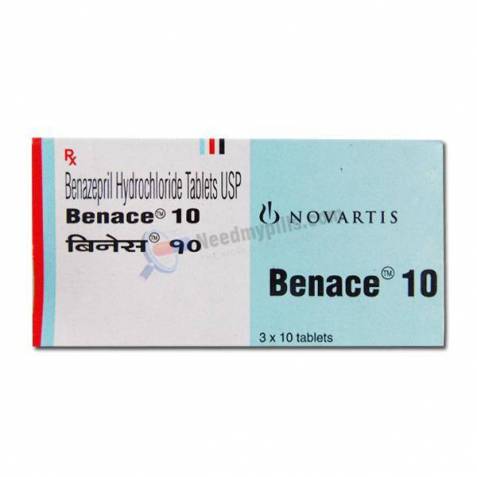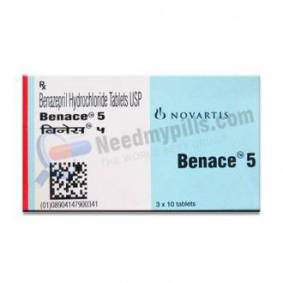What is Benace 10 Mg?
Enalapril maleate, the active ingredient in Benace 10 mg, is an ACE inhibitor. Blood pressure is reduced by using ACE inhibitors. Hypertension (high blood pressure) and heart failure are two of its most common medical applications.
The blood pressure-raising effects of angiotensin II are counteracted by the blood pressure-lowering effects of enalapril maleate by inhibiting the enzyme responsible for its production. Benace 10 mg works to reduce blood pressure and make the heart's job easier by preventing the body from producing angiotensin II.
What are the Uses of Benace 10 Mg?
Benace 10 mg is prescribed to patients with hypertension or heart failure. In some cases of kidney disease, it may be used in conjunction with other drugs.
The risks associated with untreated high blood pressure are considerable. Benace 10 mg can help lower blood pressure and decrease the risk of cardiovascular disease, stroke, and kidney disease.
If your heart is failing and not pumping enough blood, you have heart failure. By easing the strain on the heart and increasing blood flow to the body, Benace 10 mg can alleviate symptoms of heart failure like shortness of breath and fatigue.
Benace, in doses up to 10 mg, has also been studied for use in the management of diabetic nephropathy. Benace 10 mg can help slow the progression of kidney damage by lowering blood pressure and increasing blood flow to the kidneys.
Benace 10 mg should not be used to treat any condition without a proper medical diagnosis and only under the supervision of a healthcare provider.
Benace 10 Mg Side Effects
Side effects are possible with Benace 10 mg, as they are with any medication. The following side effects of Benace 10 Mg includes:
- Feelings of faintness or dizziness
- Cough
- Headache
- Nausea
- Fatigue
- Diarrhea
- Itchy or a rash
- Vision impairment
The majority of people who experience these side effects report that they are mild, short-lived, and disappear as their bodies adjust to the medication. However, you should consult your doctor if any of these negative effects continue or worsen.
Warning
Benace 10 mg comes with several important precautions and warnings, including:
Benace 10 mg should not be used by pregnant women, and breastfeeding women should avoid taking the drug. There is also concern that it could enter the breast milk and harm infants. Before taking the medication, expectant or nursing mothers should consult with their doctor.
Benace 10 mg, like other angiotensin-converting enzymes (ACE) inhibitors, may cause allergic reactions in some people. Swelling of the mouth, lips, tongue, or throat; breathing difficulties; hives; are all potential symptoms of an allergic reaction. If you are having any of these symptoms, you should see a doctor immediately.
Benace 10 mg can harm kidney function, especially in those with preexisting kidney disease. Your kidney function may need to be monitored frequently while you are taking the medication.
Benace 10 mg can lower blood pressure, leading to lightheadedness, fainting, and difficulty seeing. If you feel any of these things coming on, take a seat or lie down. Your blood pressure may need to be adjusted or monitored more frequently by your doctor.
Rarely, Benace 10 mg can cause angioedema, a potentially fatal swelling of the face, lips, tongue, or throat. Get checked out right away if you notice any kind of swelling.
Benace 10 mg should be taken exactly as prescribed, and any unusual symptoms or side effects experienced while taking the drug should be reported to your doctor immediately.
Interactions of Benace 10 Mg With Other Drugs
The effectiveness or safety of Benace 10 mg could be altered by its interaction with other drugs, vitamins, and herbs. Before taking Benace 10 mg, tell your healthcare provider about all the drugs you're currently taking, including any that you get without a prescription.
Benace 10 mg may interact with some medications, including but not limited to:
Combining Benace 10 mg with diuretics (water pills) may increase the danger of low blood pressure and kidney problems.
Aspirin and other nonsteroidal anti-inflammatory drugs (NSAIDs) increase the risk of kidney problems and decrease the efficacy of Benace 10 mg.
When combined with potassium supplements or salt substitutes, Benace 10 mg can raise potassium levels in the blood to dangerously high levels.
Benace 10 mg can lead to dangerously high blood levels of lithium.
Benace 10 mg increases the risk of low blood pressure and kidney problems when combined with other blood pressure medications.
Benace 10 mg can increase the risk of low blood pressure, and alcohol consumption may exacerbate some of the drug's side effects.
It is important to discuss all of your medications with your healthcare provider before taking Benace 10 mg, not just those on this list.
Benace 10 mg should be taken exactly as prescribed by your doctor, and any unusual symptoms or side effects, including drug interactions, should be reported immediately.




 0 / Reviews /
Write a Review
0 / Reviews /
Write a Review

